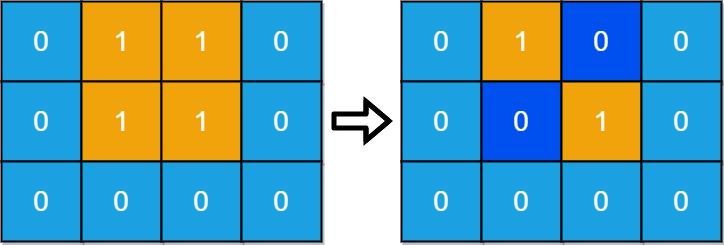You are given an m x n binary grid grid where 1 represents land and 0 represents water. An island is a maximal 4-directionally (horizontal or vertical) connected group of 1's.
The grid is said to be connected if we have exactly one island, otherwise is said disconnected.
In one day, we are allowed to change any single land cell (1) into a water cell (0).
Return the minimum number of days to disconnect the grid.
Example 1:
Input: grid = [[0,1,1,0],[0,1,1,0],[0,0,0,0]]Output: 2 Explanation: We need at least 2 days to get a disconnected grid. Change land grid[1][1] and grid[0][2] to water and get 2 disconnected island.
Example 2:
Input: grid = [[1,1]] Output: 2 Explanation: Grid of full water is also disconnected ([[1,1]] -> [[0,0]]), 0 islands.
Constraints:
m == grid.lengthn == grid[i].length1 <= m, n <= 30grid[i][j]is either0or1.
class Solution:
def minDays(self, grid: List[List[int]]) -> int:
if self.count(grid) != 1:
return 0
m, n = len(grid), len(grid[0])
for i in range(m):
for j in range(n):
if grid[i][j] == 1:
grid[i][j] = 0
if self.count(grid) != 1:
return 1
grid[i][j] = 1
return 2
def count(self, grid):
def dfs(i, j):
grid[i][j] = 2
for a, b in [[0, -1], [0, 1], [1, 0], [-1, 0]]:
x, y = i + a, j + b
if 0 <= x < m and 0 <= y < n and grid[x][y] == 1:
dfs(x, y)
m, n = len(grid), len(grid[0])
cnt = 0
for i in range(m):
for j in range(n):
if grid[i][j] == 1:
dfs(i, j)
cnt += 1
for i in range(m):
for j in range(n):
if grid[i][j] == 2:
grid[i][j] = 1
return cntclass Solution {
private static final int[] DIRS = new int[] {-1, 0, 1, 0, -1};
private int[][] grid;
private int m;
private int n;
public int minDays(int[][] grid) {
this.grid = grid;
m = grid.length;
n = grid[0].length;
if (count() != 1) {
return 0;
}
for (int i = 0; i < m; ++i) {
for (int j = 0; j < n; ++j) {
if (grid[i][j] == 1) {
grid[i][j] = 0;
if (count() != 1) {
return 1;
}
grid[i][j] = 1;
}
}
}
return 2;
}
private int count() {
int cnt = 0;
for (int i = 0; i < m; ++i) {
for (int j = 0; j < n; ++j) {
if (grid[i][j] == 1) {
dfs(i, j);
++cnt;
}
}
}
for (int i = 0; i < m; ++i) {
for (int j = 0; j < n; ++j) {
if (grid[i][j] == 2) {
grid[i][j] = 1;
}
}
}
return cnt;
}
private void dfs(int i, int j) {
grid[i][j] = 2;
for (int k = 0; k < 4; ++k) {
int x = i + DIRS[k], y = j + DIRS[k + 1];
if (x >= 0 && x < m && y >= 0 && y < n && grid[x][y] == 1) {
dfs(x, y);
}
}
}
}class Solution {
public:
const vector<int> dirs = {-1, 0, 1, 0, -1};
int m, n;
int minDays(vector<vector<int>>& grid) {
m = grid.size(), n = grid[0].size();
if (count(grid) != 1) {
return 0;
}
for (int i = 0; i < m; ++i) {
for (int j = 0; j < n; ++j) {
if (grid[i][j] == 1) {
grid[i][j] = 0;
if (count(grid) != 1) {
return 1;
}
grid[i][j] = 1;
}
}
}
return 2;
}
int count(vector<vector<int>>& grid) {
int cnt = 0;
for (int i = 0; i < m; ++i) {
for (int j = 0; j < n; ++j) {
if (grid[i][j] == 1) {
dfs(i, j, grid);
++cnt;
}
}
}
for (int i = 0; i < m; ++i) {
for (int j = 0; j < n; ++j) {
if (grid[i][j] == 2) {
grid[i][j] = 1;
}
}
}
return cnt;
}
void dfs(int i, int j, vector<vector<int>>& grid) {
grid[i][j] = 2;
for (int k = 0; k < 4; ++k) {
int x = i + dirs[k], y = j + dirs[k + 1];
if (x >= 0 && x < m && y >= 0 && y < n && grid[x][y] == 1) {
dfs(x, y, grid);
}
}
}
};func minDays(grid [][]int) int {
m, n := len(grid), len(grid[0])
dirs := []int{-1, 0, 1, 0, -1}
var dfs func(i, j int)
dfs = func(i, j int) {
grid[i][j] = 2
for k := 0; k < 4; k++ {
x, y := i+dirs[k], j+dirs[k+1]
if x >= 0 && x < m && y >= 0 && y < n && grid[x][y] == 1 {
dfs(x, y)
}
}
}
count := func() int {
cnt := 0
for i := 0; i < m; i++ {
for j := 0; j < n; j++ {
if grid[i][j] == 1 {
dfs(i, j)
cnt++
}
}
}
for i := 0; i < m; i++ {
for j := 0; j < n; j++ {
if grid[i][j] == 2 {
grid[i][j] = 1
}
}
}
return cnt
}
if count() != 1 {
return 0
}
for i := 0; i < m; i++ {
for j := 0; j < n; j++ {
if grid[i][j] == 1 {
grid[i][j] = 0
if count() != 1 {
return 1
}
grid[i][j] = 1
}
}
}
return 2
}

